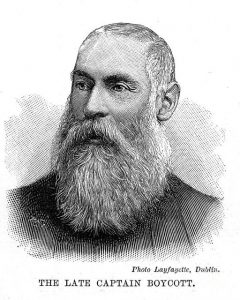Interesting – Etymological History
On March 12, 1832, noted Victorian-Era British land agent Charles Cunningham Boycott (1832-1897), namesake of the verb “boycott,” was born at the village of Burgh Saint Peter in the district of South Norfolk, England.
☞Captain Charles Cunningham Boycott (1832-1897) was serving as a land agent in Ireland in 1880 when he was ostracized by his local community as part of the Irish Land League’s campaign for the “Three Fs” (Fair Rent, Fixity of Tenure, & Free Sale).
☞According to noted Victorian-Era Scottish-American journalist James Redpath (1833-1891), the verb “to boycott” was coined on September 23, 1880, by the Reverend Father John O’Malley, parish priest at the village of Neale in County Mayo, during a discussion between the two. The following is Redpath’s account:
I said, “I’m bothered about a word.”
“What is it?” asked Father John.
“Well,” I said, “When the people ostracise a land-grabber we call it social ex-communication, but we ought to have an entirely different word to signify ostracism applied to a landlord or land agent like Boycott. Ostracism won’t do — the peasantry would not know the meaning of the word — & I can’t think of any other.”
“No,” said Father John, “ostracism wouldn’t do.” He looked down, tapped his big forehead, & said: “How would it do to call it to Boycott him?”
☞The photograph depicts the bearded visage of Captain Charles Boycott in an 1897 line-engraved portrait.
